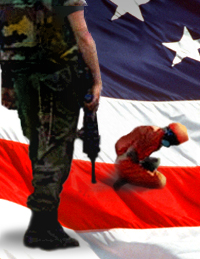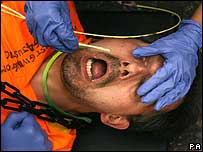Home / Terror Detainees

Omar Khadr turned 21 in Guantanamo this week. He's been detained there since he was 15.
A military judge threw out the charges against him on jurisdictional grounds in June. Another judge later upheld that decision.
Today, the U.S. Court of Military Commission Review issued its first opinion. It reinstated the charges against Omar.
The ruling reverses a military judge's June 4 ruling that the tribunal system created by Congress did not have authority to try detainees unless they were first determined to be unlawful enemy combatants.
The New York Times has this more in-depth report on the ruling.
My all-time favorite quote on Omar Khadr is by Jeanne D'Arc at her now defunct Body and Soul blog:
He's eighteen years old. When he was captured in Afghanistan, he was fifteen -- a child turned into a soldier by parents from hell. And our government's response to this victim of child abuse was to abuse him further.
His lawyers have alleged he was tortured.
More...
(57 comments, 516 words in story) There's More :: Permalink :: Comments


Just a few months ago, Gitmo seemed headed for closure, thanks to a bill introduced by Sen. Tom Harkin and another by Sen. Diane Feinstein.
Now, the passage of either bill is in serious doubt. Harkin's bill failed to generate co-sponsors.
The detention facility has been embraced by many Republicans as a potent political symbol in their quest to seize the terrorism issue ahead of next year's elections. GOP presidential candidates have jockeyed to demonstrate their support for the prison. One candidate has called for doubling its use. Another praised the menu and health plan offered to detainees.
Republican Senator Chuck Hagel, who supports closure, says:
(8 comments, 595 words in story) There's More :: Permalink :: Comments
Far from getting ready to close Guantanamo, the U.S. is spending big bucks there to build new courtrooms.
The U.S. military is building a mobile courtroom complex on an unused runway at the Guantanamo Bay naval base and plans to be ready by March to conduct as many as three terrorism trials at a time.
The $10 million project will add two new courtrooms to the existing one, which is being fitted with a new computer projection system to display evidence for the war crimes tribunals set up to try suspected al Qaeda operatives held at the U.S. naval base in eastern Cuba.
The Pentagon now plans to try 80 of the prisoners on war crimes and to hold up to 3 trials at a time. Called a "mobile courtroom complex" the new project appears to be made of tents:
More...
(8 comments, 234 words in story) There's More :: Permalink :: Comments
The Center for Constitutional Rights has filed what it says is a "groundbreaking brief" (available here) on behalf of Guantanamo detainees.
On August 24, 2007, Center for Constitutional Rights (CCR) attorneys and co-counsel submitted a ground-breaking brief to the Supreme Court in the case that will determine whether detainees at Guantánamo possess the fundamental constitutional rights to due process and habeas corpus.
The brief was filed on behalf of men from the first habeas corpus petitions submitted immediately after the landmark 2004 Supreme Court decision in CCR's case Rasul v. Bush. Al Odah v. United States, as the case is now called, has been consolidated with a related case, Boumediene v. Bush; both challenge the Military Commissions Act (MCA), which attempted to strip away the statutory right to habeas corpus the Supreme Court recognized in 2004 and replace it with a far more limited review process set up by the Detainee Treatment Act (DTA).
(44 comments) Permalink :: Comments

Force-feeding is painful. Newsweek this week examines whether doctors should be force-feeding the detainees in the wake of a recent visit by Dr. S. Ward Casscells, the new assistant secretary of Defense for health affairs. His verdict: it's okay.
Casscells watched as a half-dozen Gitmo prisoners went through the 45-minute procedure. They were strapped into "restraint chairs" and a L/jo-inch soft rubber tube was fed through their noses. (Prisoners may request a local anesthetic to ease the discomfort.) The patients ingest a tasteless high-protein mix, and guards watch them for an hour to make sure they do not self-induce vomiting. "Nobody kicked or screamed," Casscells says.
Other Gitmo doctors agree:
There are seven doctors at Gitmo, and according to Casscells, none has objected to the forced feedings."
Hundreds of other doctors around the world disagree and sharply condemned force-feeding in a letter to the Lancet medical journal.
(38 comments) Permalink :: Comments


Jane Mayer in The New Yorker Magazine today exposes the torturous interrogation practices the C.I.A. used on its prize detainee, Khalid Sheikh Mohammed, during his not-so secret stay in an overseas prison.
Author Jane Mayer, on the CBS Evening News, said:
"The Red Cross went in and got to interview these people for the first time," said Mayer on the CBS Evening News. "What these people described was hanging from the ceilings by their arms and being water-boarded, partially drowned, put on leashes and knocked into walls and basically deprived of all kinds of sensory imagery for years."
The article also puts the lie to President Bush's continuous insistence that the U.S. does not engage in torture.
Mayer's article further described the CIA program of physical and psychological abuse as completely regimented and deliberate.
"There have always been mistakes made in the past when prisoners have been abused in wars," Mayer told Mitchell. "But this is the first time it's been done on purpose."
More...
(24 comments, 391 words in story) There's More :: Permalink :: Comments
In December, 2002, Mullah Habibullah and a man named Dilawar died while being held for interrogation at Bagram Airbase in Afghanistan. Their deaths were ruled homicides, caused by blunt force trauma. In other words, they were beaten to death. I describe their awful deaths here.
The military investigated, brought charges against a dozen or more soldiers. No one was held accountable. Here's an account of what happened in court.
Witnesses say a federal grand jury in Virginia is now investigating the killings.
In interviews over the past week, three soldiers and an officer from an Ohio-based 377th military police reserve company told The Associated Press they were called as witnesses to the federal grand jury in northern Virginia near the Pentagon. The 377th ran the jail at Bagram Air Field.
The men said they had been told the grand jury's targets were no longer in the military. Federal law allows the civilian prosecution of service members who have left the military since the crime occurred, even if military authorities previously have brought charges.
I hope it's not too late for justice for Habibullah and Dilawar. But, judging from what the recently subpoenaed ex-soldiers told the Associated Press, don't count on it. Sounds like the "blue wall of silence" is kicking in:
More...
(1 comment, 345 words in story) There's More :: Permalink :: Comments
Washington Post columnist Jackson Diehl has returned from a trip to Guantanamo where he was allowed to sit in on interrogations.
Diehl reports the Pentagon has shifted from harsh interrogation techniques to ones that stress "the milk of human kindness."
He writes that 360 detainees remain at Guantanamo and 100 interrogation sessions occur each week.
Detainees being worked by the staff of 21 interrogators are invited to leave their small cells for private rooms typically equipped with televisions and comfortable chairs. About five times out of seven, one official told me, the prisoners are asked no questions; instead, pistachios, Subway and McDonald's sandwiches, and other food treats are served, and the session consists of light conversation or the watching of a movie.
Special treats are offered to those who cooperate: One prisoner, I was told, has become an avid reader of the Harry Potter books and was offered access to the latest installment in exchange for responsiveness.
The Good news is Gitmo seems to be winding down.
Fifteen Saudi prisoners were sent home last week; 80 other detainees have been cleared for transfer. One senior official said that he believed only 50 to 75 prisoners here cannot be either sent home or put on trial.
This means of the 360 prisoners still there, most for more than five years, 300 of them have been found not to be a threat or to warrant criminal charges. What a black stain for the U.S. All the pistachios and Harry Potter books in the world can't erase that.
(28 comments) Permalink :: Comments


Oh, who to believe? Reuters leads with "Bush puts CIA prisons under Geneva Conventions" while Human Rights Watch calls Bush's latest executive order confirming the power of the CIA to interrogate detainees using harsh methods a violation of international law.
Of course, the procedures Bush is authorizing are classified. It's his opinion they don't constitute torture. Hardly a guarantee you can take to the bank. The New York Times reports:
A new executive order signed by President Bush does not authorize the full set of harsh interrogation methods used by the C.I.A. since the program began in 2002. But government officials said the rules would still allow some techniques more severe than those used in interrogations by military personnel in places like the detention center in Guantánamo Bay, Cuba.
....In a conference call with reporters on Friday, a senior administration official indicated that another technique now forbidden would be exposure to temperature extremes, and the executive order itself states that detainees must be protected “from extremes of heat and cold.” It is unclear whether sleep deprivation, another technique used in past C.I.A. interrogations, is authorized.
And why not let the Red Cross visit the detainees?
More...
(3 comments, 388 words in story) There's More :: Permalink :: Comments
J covered the startling SCOTUS reversal on granting cert in the DC Gitmo detainee cases earlier and here, Orin Kerr predicts reversal:
What's remarkable about this isn't that the Supreme Court agreed to hear them, but how: the Court denied cert at first back in April, with several Justices writing opinions in the cert denial, and then granted a petition for rehearing. This is extremely unusual, and it is probably a pretty good sign that a reversal is likely.
As I argued earlier this year, Kerr believes Boumediene is in conflict (Kerr uses the professorial description of "tension") with Rasul:
(6 comments, 311 words in story) There's More :: Permalink :: Comments
Scotus Blog reports that in a change not seen since 1968, the Supreme Court has reversed course in two Guantanamo cases. Months ago it denied the detainees' Petitions for Writ of Certiorari, refusing to accept their cases.
Today, by a ruling of at least 5 to 4, which is required for such a change, the Court reversed itself and said it will hear the appeals.
The Court's order is reprinted below:
(2 comments, 491 words in story) There's More :: Permalink :: Comments

Tomorrow at 2:00 pm ET, the House Judiciary Subcommittee on the Constitution, Civil Rights, and Civil Liberties Oversight will hold a hearing on Habeas Corpus and Detentions at Guantanamo Bay.
Morris D. Davis is the chief prosecutor in the Defense Department’s Office of Military Commissions. In the New York Times today, he provides what he believes to be a vigorous defense of the commission procedures.
Let's take a look at his arguments, which in my view, by their omissions, amount to misreprsentations:
Many critics disapprove of the potential admissibility of evidence obtained by coercion and hearsay. Any statement by a person whose freedom is restrained by someone in a position of authority can be viewed as the product of some degree of coercion. Deciding how far is too far is the challenge. I make the final decision on the evidence the prosecution will introduce. The defense may challenge this evidence and the military judge decides whether it is admitted. If it is admitted, both sides can argue how much weight, if any, the evidence deserves. If a conviction results, the accused has the assistance of counsel in four stages of post-trial appellate review. These are clearly robust safeguards.
After arguing in favor of the hearsay standard used at the tribunals, he concludes:
More....
(29 comments, 1114 words in story) There's More :: Permalink :: Comments
| << Previous 12 | Next 12 >> |







